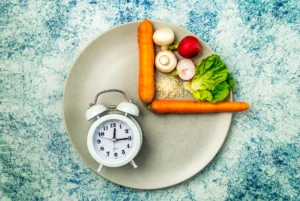
The Hidden Power of Fasting Intermittent: Unlock Natural Healing
Fasting intermittently is a popular way to improve health and wellness. It involves alternating between eating and fasting periods, allowing flexibility for those who want

In today’s fast-paced world, maintaining a balanced and healthy diet often takes a back seat. We find ourselves reaching for convenience foods, sugary snacks, and takeout menus, all while our bodies silently plead for better nutrition. But what if we told you that in just 30 days, you could embark on a transformative journey towards optimal health through the power of a well-structured whole30 diet plan?
Welcome to our 30-Day Diet Challenge – a comprehensive guide designed to help you revitalize your health, improve your eating habits, and rejuvenate your overall well-being. Whether you’re looking to shed a few pounds, boost your energy levels, or simply adopt a more mindful approach to eating, this challenge is your roadmap to success.

A Whole30-day challenge to optimal digestive health is a structured detox plan. It is aimed at improving your digestive system’s function and overall well-being. Digestive health is essential for nutrient absorption, energy levels, and overall health, so taking steps to optimize it can lead to numerous benefits.
The Whole30 diet plan was developed by Dallas Hartwig and Melissa Hartwig. It’s a diet 30-day plan designed to help you reset your eating habits and change your health. Eating Whole30 means cutting out certain foods, including grains, dairy, legumes, soy, and any added sugars or sweeteners.
Food freedom” is a concept closely associated with the Whole30 diet. It’s a term coined by the creators of the Whole30 program to describe the ultimate goal and mindset they hope participants will achieve after completing the 30-day challenge. Food freedom means having a healthy and balanced relationship with food, where you are in control of your choices, enjoy a wide variety of foods, and make decisions that align with your health and well-being without feeling restricted or obsessed with food.
Here’s a general outline of a 30-day challenge to help you achieve optimal digestive health:
Start by setting clear and realistic goals for your 30-day diet challenge. Whether your goal is to reduce weight, increase energy, or enhance your general health, having specific objectives will help keep you motivated.
Take stock of your current eating habits. What foods do you typically consume, and what might need to change to align with your goals? Identify problem foods.
Create a meal plan for the week ahead. Focus on minimally processed foods such as whole foods, lean proteins, healthy fats, plenty of vegetables, and complex carbohydrates. Choose potentially problematic foods and then eliminate foods with a negative impact. Have a shopping list to ensure you have everything you need to eat real food.

Begin your day with a glass of water to kickstart your metabolism and stay hydrated throughout the day.
Aim to drink at least 8 glasses (64 ounces) of water throughout the day to support digestion and overall health.
Consider adding some herbal teas or infused water for variety and flavor.
Start your day with a balanced breakfast that includes protein, healthy fats, and fiber. This can be a veggie omelet, Greek yogurt with berries and nuts, or oatmeal with almond butter.
Avoid sugary cereals and pastries, which can lead to energy crashes later in the day. Reduce the amount of processed and fast food in your diet. They can be hard on the digestive system due to their high fat, sugar, and preservative content.
Plan healthy snacks to keep your energy levels steady. Opt for options such as fresh fruit, mixed nuts, or veggie sticks with hummus.
Avoid processed snacks high in sugar and unhealthy fats.
Practice mindful eating by slowing down during meals, savoring each bite, and paying attention to your body’s hunger and fullness cues.
Avoid distractions like phones or TV while eating to fully focus on your food.
Challenge yourself to include vegetables in every meal today. They are rich in vitamins, minerals, and fiber.
Experiment with different cooking methods and seasonings to make veggies more appealing.
Incorporate regular physical activity into your routine. Plan your workouts for the upcoming week, whether it’s daily walks, home workouts, or gym sessions.
Choose activities you enjoy to make exercise a sustainable part of your lifestyle.
Throughout this first week, monitor your progress, how your body feels, and any changes you notice. Remember, consistency is key to success in any diet challenge. Stay motivated and focused on your goals as you continue your 30-day journey to better health.
Focus on incorporating lean protein sources into your meals today. Good options include grilled chicken, tofu, fish, or beans.
Protein helps with muscle maintenance and keeps you feeling full.
Make it a priority to eat foods high in fiber today. Oatmeal, whole grains, legumes, and vegetables are excellent choices.
Fiber aids digestion and helps maintain stable blood sugar levels.
Include sources of healthy fats in your diet, such as avocados, nuts, and olive oil.
These fats are essential for overall health and can help keep you satisfied.
Pay close attention to portion sizes today. Use smaller plates to help control portions and prevent overeating.
Eating mindfully and in moderation is key to long-term success.
Challenge yourself to create a colorful plate at each meal. Different colored fruits and vegetables provide various nutrients.
The more colorful your plate, the more diverse your nutrient intake.
Experiment with a new healthy recipe or cooking technique today. Learning to prepare nutritious meals can make sticking to your diet more enjoyable.
Consider taking a cooking class or watching instructional videos for inspiration.
Recognize the importance of rest and recovery for your overall health. Prioritize getting enough sleep tonight.
Sleep is crucial for energy levels, mood, and weight management.
Throughout this second week, continue to track your progress, make adjustments as needed, and stay committed to your goals. Building healthy habits takes time, but the positive changes you’re making will have a lasting impact on your well-being.
Explore the world of superfoods today. Incorporate foods like blueberries, kale, quinoa, and chia seeds into your meals.
Superfoods are packed with nutrients and can boost your overall health.
Dedicate today to meal-prepping for the upcoming week. Prepare healthy meals and snacks in advance to make sticking to your diet easier.
Having nutritious options readily available can prevent impulsive, unhealthy choices.
Allow yourself a small treat today, but practice mindful eating while doing so. Savor every bite and enjoy it guilt-free.
Remember, occasional treats are part of a balanced diet.
Step out of your comfort zone and try a new type of cuisine or an ingredient you’ve never cooked with before.
Experimentation can keep your diet exciting and diverse.
Explore different protein sources today. If you’ve been primarily eating chicken, try fish or plant-based proteins like tofu or tempeh.
A variety of protein sources ensures a well-rounded diet.
Reevaluate your hydration habits. Are you drinking enough water? Adjust your intake as needed to stay adequately hydrated.
Dehydration can sometimes be mistaken for hunger, so staying hydrated can aid in appetite control.
Reach out to friends or family members who may be interested in joining your diet challenge or offering support.
Sharing your goals with others can provide motivation and accountability.
As you enter the third week of your 30-day diet challenge, you’re likely starting to notice positive changes in your energy levels, mood, and overall well-being. Maintain your dedication to your goals and embrace the journey to better health.
Dedicate today to mindful eating. Focus on every bite, eat slowly, and listen to your body’s hunger and fullness cues.
Eating mindfully can help you avoid overindulging and enhance your relationship with food.
Take some time to reflect on your journey so far. What changes have you noticed? What challenges have you faced and overcome?
Express gratitude for your accomplishments and the positive impact of adopting healthier habits.
Explore healthy snack options to satisfy your cravings. Opt for whole, unprocessed foods like fruit, Greek yogurt, or a handful of nuts.
Avoid mindless snacking by having pre-portioned snacks on hand.
If you are going to dine at a restaurant, look through the menu ahead of time and select a well-balanced, healthy meal.
Practice portion control and avoid the breadbasket or excessive appetizers.
Reevaluate your goals for the final stretch of your 30-day diet challenge. Are they still achievable and realistic?
Adjust your goals if necessary to stay motivated.
Probiotics: Consider taking a high-quality probiotic supplement to support a healthy gut microbiome.
Building and maintaining a healthy gut microbiome is essential to overall well-being. The Well Of Life™ Probiotic contains 40 Billion CFU to ensure that you are getting the right amount of beneficial bacteria you need.

Prebiotic Foods: Incorporate prebiotic-rich foods like garlic, onions, leeks, and asparagus into your diet to nourish beneficial gut bacteria.
Digestive Enzymes: Discuss with a healthcare professional if digestive enzyme supplements might be beneficial for you.
Digestive enzymes are essential to properly break down food and make it ready for absorption into your body. The Well of Life’s Digestive Enzyme Blend with Makzyme-Pro™ digestive enzyme supplement is a great way to obtain the full benefit from the foods you’re eating.

Cook a homemade dinner from scratch tonight. It will give you complete control over the ingredients and portions.
Invite a friend or family member to share the meal with you, reinforcing healthy eating habits and allowing you to prepare foods that are healthier for you.
Ensure you’re still meeting your daily hydration goals. Maintaining adequate hydration is essential for digestion and overall well-being.
Carry a reusable water bottle with you to make it easier to drink throughout the day.
Start thinking about how you will maintain your healthier eating habits beyond the 30-day challenge. Consider long-term strategies and continue to set achievable goals.
Think about what you’ve learned during this challenge that you can carry forward.
Engage in regular physical activity to promote overall health, which can have a positive effect on digestion and a weight loss plan.
Celebrate your successes during the 30-day diet challenge. Acknowledge the positive changes you’ve made and the progress you’ve achieved.
Treat yourself to a non-food reward, like a spa day or a new book, as a way to celebrate your accomplishments.
Reflect on the entire 30-day journey. What have you learned about yourself, your relationship with food, and your body?
Begin planning for the future, setting new health and nutrition goals, and creating a sustainable eating plan for the long term.
Completing a 30-day diet challenge is a significant accomplishment, but remember that it’s just the beginning of your journey toward a healthier lifestyle. Continue to build on the habits you’ve developed, and seek support from friends or professionals if needed. Certified sports nutritionists or healthcare professionals can help you make choices that prioritize your well-being and long-term health. Congratulations on your commitment to better health!
When embarking on a Whole30-day diet challenge aimed at improving overall health, it’s important to focus on whole, nutritious foods.
The Whole30 diet is a 30-day elimination diet that emphasizes whole, unprocessed foods while excluding certain food groups that may negatively impact your health. The Whole30 diet comprises of five food groups: proteins, vegetables, fruits, nuts and seeds, and healthy fats.

Here’s a list of foods you can consume on a Whole30 diet:
Pasture-raised poultry (chicken, turkey, duck)
Wild-caught fish (salmon, cod, haddock, etc.)
Eggs (preferably pasture-raised)
Fruits (in moderation)
Nuts and Seeds (in moderation)
Healthy Fats
Beverages
Counting calories is vital to any 30-day diet plan. Therefore, carbohydrates are one food group that should be eliminated. However, there are healthier options if needed, such as brown rice or zucchini noodles.
The Whole30 program helps to improve physical and mental health by avoiding highly processed foods and junk food and eliminating dairy.
Here are some foods that should be off-limits during your 30-day diet plan:
All forms of added sugar, including honey, maple syrup, and artificial sweeteners.
The Whole30 diet is designed to reset your eating habits and identify foods that are perhaps causing inflammation, food sensitivities, or digestive issues. It’s important to follow the guidelines strictly for the full 30 days to experience the potential health benefits. Then gradually reintroduce food groups one by one to see how they affect you. Consulting a healthcare professional or registered dietitian before starting any restrictive diet is always advisable, especially if you have specific health concerns or conditions.
Remember, your Whole30 journey is just the beginning of a lifelong adventure in nourishing your body and cultivating a healthy relationship with food. Continue to celebrate your successes, learn from your experiences, and remain open to the ever-evolving nature of your dietary choices.
As you move forward, embrace food freedom with confidence, knowing you have the knowledge and empowerment to make choices that align with your unique needs and aspirations. Cherish the newfound appreciation for authentic, whole foods, and savor the delicious, nutritious meals that will continue to fuel your journey toward a happier, healthier you.
Cheers to your Whole30 journey and the limitless possibilities that await as you navigate the path to lifelong well-being and food freedom. Here’s to a future filled with nourishing choices, vibrant health, and a heart full of gratitude for the incredible journey you’ve embarked upon.

Fasting intermittently is a popular way to improve health and wellness. It involves alternating between eating and fasting periods, allowing flexibility for those who want

Gluten-free lifestyles might seem intimidating, particularly if you’re just getting started. All sorts of tasty and healthy options that you may not have thought of

Basic Health for Men: A Gentle Guide for a Better Lifestyle Health for men is a topic that is often overlooked because there are more

The Power of A Digital Detox: Revitalizing Your Life A digital detox is needed now more than ever, as digital devices are our most valuable

The Role of Chlorine Dioxide in Holistic Healing: Alternative Therapies Chlorine dioxide (CDS), also known as the miracle solution, has been underestimated for many years.

A vertigo dizziness remedy can be difficult to find as vertigo can be an unsettling experience. This often leads to a spinning sensation and feeling


This website or its third-party tools use cookies, which are necessary for its functioning and required to achieve the purposes illustrated in the cookie policy. You accept the use of cookies by closing or dismissing this notice, by clicking a link or button or by continuing to browse otherwise.
2 thoughts on “The Whole30-day challenge to Optimal Digestive Health”
look’s good
Thank you!!!